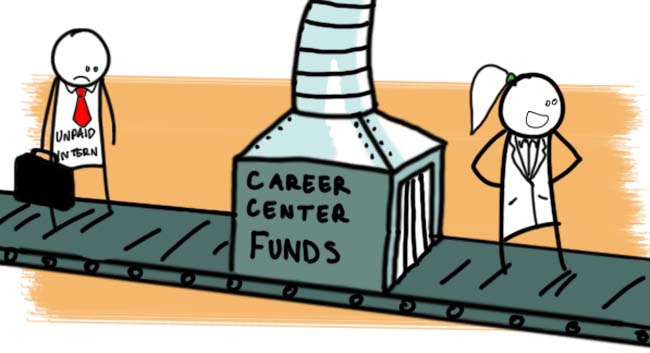Students can’t escape the necessity of internships. They also can’t escape the necessity of money, which puts them in a catch-22 when they apply for internships and inevitably find only unpaid ones: accept the internship, work hard, and earn nothing with the hope that it will help you achieve your career goals, or find a job that pays and has no prospects. Sympathizing with the student body’s plight, the Sherman and Gloria H. Cohen Career Center has started a fund to subsidize students’ unpaid internships. This year, the Career Center hopes to grant 10 students $4,000 each. This program will be a boon to students, but the Career Center could improve it in the future.
The Career Center’s fund will enable students to take valuable internships otherwise financially unavailable to them. Because many of the connections students make at the College of William and Mary are in the Washington, D.C. area, the fund would especially help those who live out of state and can’t afford to intern away from home. Students would feel more comfortable searching for internships if they knew they could take what was offered to them.
The fund is also a prime example of the Career Center responding to student need. They already help students network and find internships and they understand the burdens students face even when they succeed. With the unpaid internship fund, the Career Center demonstrates that it will continue to innovate and maintain a vital resource for students.
That said, there are areas for improvement. First, the deadline to apply is April 11, which disadvantages students who find internships past that point. Choosing among applicants may take a while, but the Career Center should extend the deadline to the end of April and give more students an opportunity to apply.
Currently, in order to qualify for funding, students cannot be interning from home. While it is important to make sure that students are getting interpersonal, professional experience, this requirement doesn’t take into account student interns who do valuable work online. It’s not necessary to intern at a traditional office to help build a website or code data.
Giving each recipient $4,000 each may not be necessary. Students who intern for at least four weeks — 160 hours — qualify for funding, yet that implies that a recipient who interns for one month will earn the same $4,000 as another who interns for three months. In the future, the Career Center should take into account exactly how much time the student will be interning when allocating funds.
While the Career Center should evaluate students’ internships based on quality, it also needs to view student need as a factor. Students who would otherwise have no source of income or parental aid may not be able to take an unpaid internship without this kind of funding.
The Career Center’s unpaid internship fund has enormous potential: Its long-term goal to create an endowment is ambitious and admirable. If it succeeds, it will give students more freedom to pursue their dreams and discover lifelong passions.


While I agree with the suggestion to pro-rate based on amount of time students are interning, I think you miss a valuable point with your deadline argument. The end of April is too close to the end of the year, meaning some students may have to turn down unpaid internships due to financial insecurity. Perhaps they could hold a portion of the awards until later in the year, but students who are proactive in organizing their internships should also be rewarded with earlier decisions about funding.